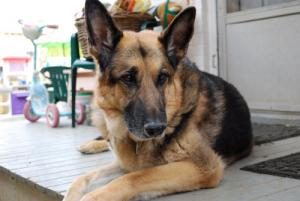
Saint, our 13-year-old German Shepherd Dog, was a huge, friendly dog who spent his days guarding his pack, watching out for the ever-present feline menace, and keeping a mindful eye on the two-legged pups running amok in our house.
We adopted him at age 3 as a “brother” for Madison, our yellow Labrador. We quickly learned his quirks: he’d go bonkers whenever it was time to go for a walk, and he
had a passion for herding cats (though it took us about a year to figure out he was trying to herd them instead of, say, eating them). When we had kids, the big brown dog took it in stride, incorporating them into his pack without without a moment’s pause. He and Mad Dog spent many a long summer day watching the kids, barking at neighbors, and insuring that we always knew when the mailman had arrived.
He was smarter than your average pooch — you could ask him questions, and he’d bark his answer, letting us know when he was hungry, needed a walk, or just wanted a snack … at least until he went deaf and could no longer hear the questions.
Not content to guard just our house from the feline menace, he would occasionally jump the fence to patrol the neighborhood and make sure that our neighbor’s cats weren’t up to some nefarious plot.
They weren’t … but you never know.
He always returned from these patrols (sometimes because we chased him, sometimes on his own) and while it was clear he felt guilty about leaving his pack, there was no doubt that he also felt a certain degree of satisfaction from saving the world. Again.
Never a big fan of the water — he left that to the Labrador — he was more than happy to slosh around in the shallows of the Delaware River and roll in the gross, slimy mud of its banks. He rarely stooped to actually fetching sticks (again, he left this to the Labrador), he was happy to chase sticks, and make sure that Madison returned any thrown sticks in a timely manner.
He was a sensitive whiner, defying the stern, macho stereotype of the German Shepherd, and hated to be separated from his family. On walks around the neighborhood he’d get stress and whine or even bark if one of his family pack got too far ahead or fell behind.
Unfortunately, Saint’s now gone far ahead of the pack. This afternoon we had to put him to sleep.
Over the last two weeks he’d lost his appetite, and become increasingly wobbly while walking. On Saturday we had x-rays done at the vet, and it appears he had cancer of the spleen and was likely suffering from some sort of internal bleeding. Since then he’d gotten progressively work, having trouble standing and spending hours laying in the backyard flower bed.
It was a hard, sad thing to do. But also the right thing to do. He had a good life, and it would have
been wrong to prolong his suffering to make us feel better.
Over the weekend I was at a conference and got to talking with some dog people. I didn’t mention our problems with Saint, but the question of canine mortality came up anyway, and someone asked why we do this to ourselves. Why do we get a puppy knowing that at some point in the future — it may be 5 years, it may be 15 — we’ll be saying good bye.
I didn’t answer then, but I will now. The answer’s the same for any relationship, be it with your spouse, your kids, or your dog. It’s not about the painful good-byes, but rather the life lived well. It’s not about this one sad day, but all the great days behind us from the rambunctious runs in the park to hiking around New England to countless quiet evenings at home.
Good-night Saintly. May your dreams be filled with long walks, suspicious cats, and kids in need of watching.
